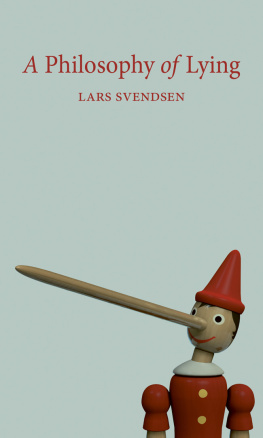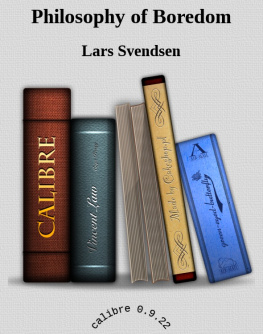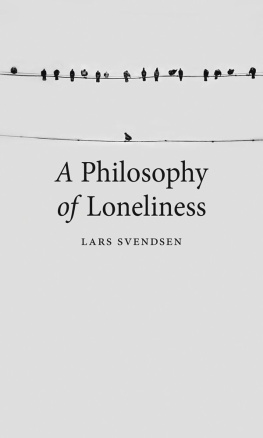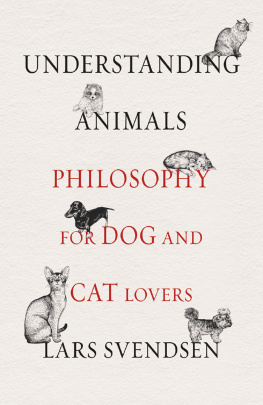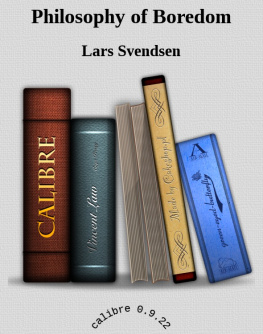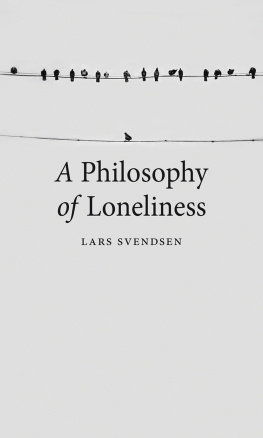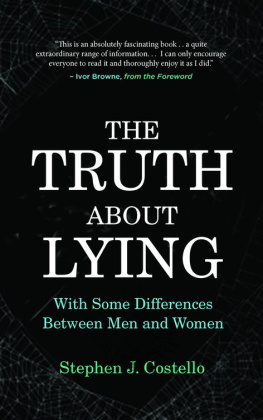A PHILOSOPHY OF LYING

A Philosophy of Lying
Lars Svendsen
Translated by
Matt Bagguley
REAKTION BOOKS
Published by Reaktion Books Ltd
Unit 32, Waterside
4448 Wharf Road
London N1 7UX, UK
www.reaktionbooks.co.uk
First published in English 2022
English-language translation Reaktion Books 2022
Matt Bagguley asserts his moral right to be identified as the translator of the work
This book was first published in Norwegian in 2020 by Kagge Forlag AS under the title Lgnens filosofi by Lars H. Fr. Svendsen
Copyright Lars H. Fr. Svendsen 2020
Published in agreement with Oslo Literary Agency
All rights reserved
This translation has been published
with the financial support of NORLA

No part of this publication may be reproduced, stored in a retrieval system, or transmitted, in any form or by any means, electronic, mechanical, photocopying, recording or otherwise, without the prior permission of the publishers
Page references in the Index match the printed edition of this book.
Printed and bound in Great Britain by Bell & Bain, Glasgow
A catalogue record for this book is available from the British Library
eISBN 9781789145649
Contents
Introduction
Not that you lied to me,
but that I no longer believe you,
has shaken me.
FRIEDRICH NIETZSCHE, Beyond Good and Evil
E veryone lies. Everyone condemns lying. We lie even though we agree that lying is wrong. We lie for our own benefit, to appear better or less bad than we are, to get an advantage or to spare ourselves trouble and discomfort. We also lie for someone elses benefit, to spare their feelings or avoid hurting them. Its often hard to tell whether we are lying for someone elses sake or our own we like to tell ourselves that it is for someone elses sake, but even that often involves us lying to ourselves.
I cant remember when I told my first lie, nor what I was lying about. It was probably when I was three or four years old, because thats when we humans start doing that sort of thing, and it was probably to avoid being blamed for doing something wrong. I have never been a very good liar. My father, however, was a formidable liar. They werent malicious lies, just pranks, and my brother and I fell for them almost every damn time. My mother, on the other hand, saw through him most of the time. I almost never managed to fool anyone with a lie. One of the downsides of being the youngest in a family is that everyone else has a psychological advantage over you. That could explain why I never became a skilled liar I was so rarely successful that I lacked the inspiration to continue.
Nevertheless, I didnt quit completely. Since becoming aware of the possibility of lying, I have lied to everyone Ive had a relationship with. I have lied to my parents, brother, wife, girlfriends, children, friends and colleagues. After this admission, however, I feel the sudden need to sugarcoat the pill by saying that on the whole I have been honest with them all. Honesty is not necessarily just an expression of a good character, but is also due to the fact that life is easier when you are honest. A liar has to remember twice as much as someone who is telling the truth both how something really is and how he has said it is. I prefer an uncomplicated life. In this sense, honesty is as much to do with my own convenience as it is about morality. Considering merely ones own convenience, however, is a poor foundation on which to build ones moral life.
Of all the lies I have told, I like to think that most of them have been white, in that I have tried to protect someone directly by being untruthful towards them, or indirectly by telling beneficial lies to someone else about them. However, Ive also told quite a few of the grey or even black variety, where the only consideration I had was for myself where telling the truth would have created more discomfort or problems for me than telling a lie. Hopefully I have mostly avoided the really coal-black lies, where you knowingly and intentionally hurt someone else by telling a lie. My white lies have probably been in the majority. Does that mean that what I have done is okay? Is it morally acceptable to tell white lies? Of course, it is also conceivable that I suffer from such an acute level of self-deception that I am hiding the extent of my dishonesty from myself. But I dont believe that either.
Most people are truthful in general. The majority tell far fewer lies than the average person because there is a minority In the grand scheme of things, lies make up a very small part of everything we say to each other. However, this doesnt mean that lying is not a phenomenon of great importance. One lie, if serious enough, can ruin a marriage, a friendship, a career or a life.
Todays philosophical discussions about lying revolve chiefly around the question of what lies are, about what makes a lie a lie, and what distinguishes it from other related phenomena. These discussions are predominantly found in the philosophy of language. Nevertheless, some findings in this research can be mentioned briefly here. People lie less to each other when they are face to face and more when, for example, they send text messages. Extroverts lie more than introverts, even when we allow for the fact that extroverts interact more socially. Men and women lie more or less equally, but women lie more often to avoid hurting other peoples feelings, while men do it more to highlight their own brilliance. Last but not least, we lie less often to those we have a close relationship with, and we also find lying to them more disturbing.
The first chapter is devoted to a conceptual clarification of what we mean by lying. To achieve this, we will take a closer look at the concepts of truth and truthfulness, and we will also delimit lying from its close relatives, truthiness and bullshit. Lying is understood as choosing to say something you believe to be untrue in a context where the person you are talking to has reason to assume that you are telling the truth. It is important for our further discussion that the most basic terms are given a fairly precise meaning. The next chapter deals with the different views on lying within philosophical ethics, and can be said, roughly, to conclude that lying is nearly always wrong and this applies to so-called white lies too but it also concludes that there are special cases where lying can be defended. After that we turn to certain type of lies, namely the ones we tell ourselves. We humans are notorious self-deceivers, yet we seem to have an obligation to be honest with ourselves. Also, if you are the victim of a comprehensive self-deception, if you are unable to be truthful to yourself, then its unlikely you will manage to be truthful to others. If you cannot trust yourself, no one else can trust you.
Lying is generally wrong, but lying to your friends is especially wrong because you have built a special trusting relationship with them, and that is the topic of the following chapter. Friends have a stronger obligation to be truthful with each other than they do with acquaintances or strangers. It also means you have an obligation to tell your friends uncomfortable truths about themselves. Most reflections on friendship and lying are also valid for relationships with a partner or spouse. If anything, the points in this case are especially applicable since we are most likely talking about an even stronger connection, where a breach of trust in the form of a lie can be experienced as a particularly serious betrayal.

